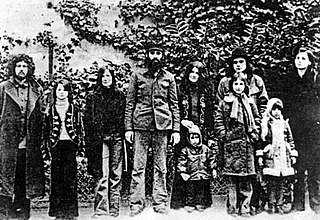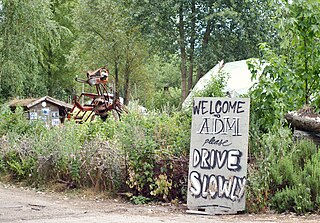Multipurpose Internet Mail Extensions (MIME) is an Internet standard that extends the format of email messages to support text in character sets other than ASCII, as well as attachments of audio, video, images, and application programs. Message bodies may consist of multiple parts, and header information may be specified in non-ASCII character sets. Email messages with MIME formatting are typically transmitted with standard protocols, such as the Simple Mail Transfer Protocol (SMTP), the Post Office Protocol (POP), and the Internet Message Access Protocol (IMAP).

Squatting is the action of occupying an abandoned or unoccupied area of land or a building, usually residential, that the squatter does not own, rent or otherwise have lawful permission to use. The United Nations estimated in 2003 that there were one billion slum residents and squatters globally. Squatting occurs worldwide and tends to occur when people who are poor and homeless find empty buildings or land to occupy for housing. It has a long history, broken down by country below.

Jason Scott Sadofsky, more commonly known as Jason Scott, is an American archivist, historian of technology, filmmaker, performer, and actor. Scott has been known by the online pseudonyms Sketch, SketchCow, The Slipped Disk, and textfiles. He has been called "figurehead of the digital archiving world".

Squat Theatre (1977–1991) was a Hungarian experimental theatre company from Budapest, which left Hungary for Paris and then New York City, where they performed experimental theatre.

The Poortgebouw is a national monument located at Stieltjesstraat 38 in the Kop van Zuid area of Rotterdam, the Netherlands. It was built beside the River Maas in 1879 and experienced a range of uses until it was squatted October 3, 1980. It had been standing empty for 2 years and was squatted as a protest intended to highlight the lack of affordable residential housing in Rotterdam.

Self-managed social centres in the United Kingdom can be found in squatted, rented, mortgaged and fully owned buildings. These self-managed social centres differ from community centres in that they are self-organised under anti-authoritarian principles and volunteer-run, without any assistance from the state. The largest number have occurred in London from the 1980s onwards, although projects exist in most cities across the UK, linked in a network. Squatted social centres tend to be quickly evicted and therefore some projects deliberately choose a short-term existence, such as A-Spire in Leeds or the Okasional Café in Manchester. Longer term social centres include the 1 in 12 Club in Bradford, the Cowley Club in Brighton and the Sumac Centre in Nottingham, which are co-operatively owned.

The Jodenbreestraat is a street in the centre of Amsterdam, which connects the Sint Antoniesluis sluice gates to the Mr. Visserplein traffic circle. North of the sluice gates, the street continues on to Nieuwmarkt square as the Sint Antoniesbreestraat. The Mozes en Aäronkerk church stands at the southern end of the street. Directly behind the Jodenbreestraat is Waterlooplein square with its daily flea market.

OT301 is a social centre which used to be a squat in the Dutch city of Amsterdam, located on Overtoom 301.

Nettime is an internet mailing list proposed in 1995 by Geert Lovink and Pit Schultz at the second meeting of the "Medien Zentral Kommittee" during the Venice Biennale. Since 1998, Ted Byfield and Felix Stalder have moderated the main list, coordinated moderation of other lists in the nettime "family," and maintained the site as their nexus.

The OCCII is a venue for alternative and independent music at Amstelveenseweg 134, in Amsterdam, Netherlands.
The Spike Surplus Scheme was a community-run self-managed social centre in a squatted building in Peckham, South London. It was occupied in 1999 and provided a range of mostly free activities for local people until its eviction in 2009 by Southwark Council.

Geert Lovink is the founding director of the Institute of Network Cultures, whose goals are to explore, document and feed the potential for socio-economical change of the new media field through events, publications and open dialogue. As theorist, activist and net critic, Lovink has made an effort in helping to shape the development of the web.

Indische Buurt is a neighborhood in the borough of Oost, the eastern part of the city of Amsterdam, Netherlands. The name of the neighborhood dates from the early 20th century, and is derived from the fact that the neighborhood's streets are named after islands and other geographical concepts in the former Dutch colony of the Dutch East Indies or now known as Indonesia. The first street was named in 1902.

Squatting in England and Wales usually refers to a person who is not the owner, taking possession of land or an empty house. People squat for a variety of reasons which include needing a home, protest, poverty, and recreation. Many squats are residential, some are also opened as social centres. Land may be occupied by New Age travellers or treesitters.
Squatting in the United States is the unauthorized use of real estate. Historically, squatting occurred during the California Gold Rush and when colonial European settlers established land rights. There was squatting during the Great Depression in Hoovervilles and also during World War II. Shanty towns returned to the US after the Great Recession of 2007 to 2009 and in the 2010s, there have been increasing numbers of people squatting foreclosed homes using fraudulent documents. In some cases, a squatter may be able to obtain ownership of property through adverse possession.

The Independent Publishing Resource Center (IPRC) is a resource center for zine creation, letterpress printing, book binding and printing, based in Portland, Oregon, United States. The center was founded in 1998 by Chloe Eudaly, owner of Reading Frenzy and Show & Tell Press, and Rebecca Gilbert, worker-owner at Stumptown Printers.

ADM was a squat in the Port of Amsterdam, to the west of the city next to the North Sea Canal. The squat lasted from 1997 until its eviction in early 2019. Around 130 people lived on the terrain of 45 hectares in buildings, on boats and in vehicles.

Squatting in Australia usually refers to a person who is not the owner, taking possession of land or an empty house. In 19th century Australian history, a squatter was a settler who occupied a large tract of Aboriginal land in order to graze livestock. At first this was done illegally, later under licence from the Crown.

Squatting in the Netherlands is the occupation of unused or derelict buildings or land without the permission of the owner. The modern squatters movement began in the 1960s in the Netherlands. By the 1980s, it had become a powerful anarchist social movement which regularly came into conflict with the state, particularly in Amsterdam with the Vondelstraat and coronation riots.
















